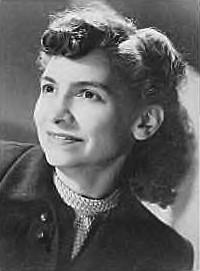Humanist Women in History: Vashti McCollum
“As long as the public school is used to recruit the child or to segregate the children according to religion or to use the truancy power of the public schools to make them go to religions classes, I’m against it.”
Church-state separation champion Vashti McCollum was born Vashti Cromwell on November 6, 1912, in Lyons, New York. Her parents, Arthur and Ruth Cromwell, had a second daughter and raised their family in Rochester, New York. Her mother named Vashti after a biblical character, Queen Vashti of Persia, who refused to follow the king’s orders and was banished. Arthur Cromwell was an architect, president of the Rochester Society of Free Thinkers, and, later in life, an out-atheist.
Vashti went to Cornell University on a scholarship, but she had to leave after the stock market crashed in 1929 and funding dried up. She transferred to the University of Illinois to study political science and law. There she met John McCollum, a horticulture professor, and they married in 1933. She left school and they had three sons, James, Dannel, and Errol. McCollum returned to the University of Illinois later to obtain her master’s in mass communications.
When her eldest son James entered fourth grade, he encountered religion classes that had been instituted several years earlier at his school, which was in the district of Champaign, Illinois. Although the classes were ostensibly voluntary, pressure was put on him to attend. After a time he refused, after which during religion class he was put at a desk in the hallway usually reserved for unruly students. Vashti took the matter to the superintendent of schools, and when nothing came of her complaint she secured funding and legal counsel. On June 11, 1945, she filed a lawsuit to bar the classes in what would become a watershed church-state case, McCollum v. Board of Education.
The case went to trial in the circuit court of Champaign County. After months of deliberation, the court decided against the McCollums. The case was appealed to the Illinois Supreme Court, where a second loss occurred, and ultimately went to the US Supreme Court. On March 8, 1948, the Supreme Court ruled that the school district’s religious instruction program was unconstitutional.
“The First Amendment rests upon the premise that both religion and government can best work to achieve their lofty aims if each is left free from the other in its respective sphere,” Justice Hugo Black wrote in the 8-1 majority opinion.
Lawyers for the school district of Champaign, Illinois, had argued that the religious instruction practice didn’t violate the Establishment Clause since all sects were treated equally. (As the New York Times reported, classes for Protestants were taught on school premises while Jewish and Roman Catholic students went to religious buildings elsewhere.) McCollum, who identified as an atheist in court documents, made the case that government-funded institutions had to maintain neutrality between belief and nonbelief.
During the three-year legal battle the McCollum family was subject to violent threats and ostracism, Vashti was fired from her job as a university dance instructor, their house was pelted with rotten fruit one Halloween, and their pet cat was found hung from a tree.
In her 1951 book, One Woman’s Fight, detailing the story of the long fight and for which she received the Holmes-Weatherly Award in 1956, McCollum wrote:
Between being praised and persecuted, condoned and condemned, I might understandably have become bewildered, particularly at the brand of ethics sometimes displayed by the staunch defenders of Christianity. But of one thing I am sure: I am sure that I fought not only for what I earnestly believed to be right, but for the truest kind of religious freedom intended by the First Amendment, the complete separation of church and state.
Vashti McCollum later served as the president of the American Humanist Association (1962-1965), was a signatory to both the Humanist Manifesto II in 1973 and the current iteration, adopted in 2003. In 1991 she was recognized by the AHA with its Distinguished Service Award.
McCollum died on August 20, 2006, in Champaign, Illinois, at the age of ninety-three.

